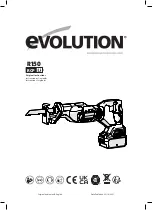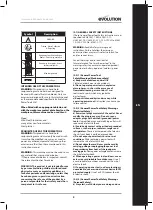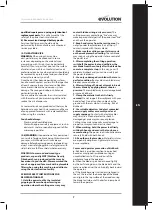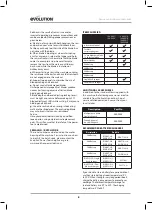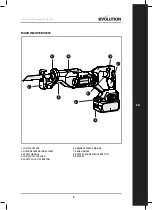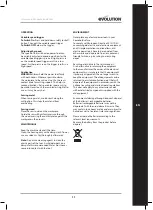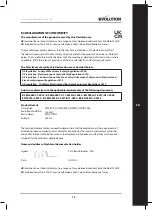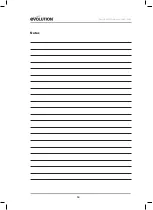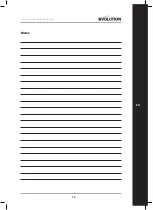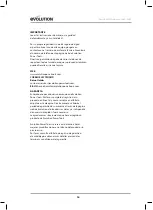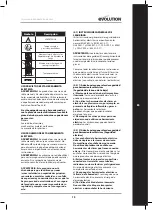
qualified repair person using only identical
replacement parts.
This will ensure that the
safety of the power tool is maintained.
b) Never service damaged battery packs.
Service of battery packs should only be
performed by the manufacturer or authorized
service providers.
(2.7)
HEALTH ADVICE
WARNING:
When using this machine,
dust particles may be produced. In some
instances, depending on the materials you
are working with, this dust can be particularly
harmful. If you suspect that paint on the surface
of material you wish to cut contains lead, seek
professional advice. Lead based paints should only
be removed by a professional and you should not
attempt to remove it yourself.
Once the dust has been deposited on surfaces,
hand to mouth contact can result in the ingestion
of lead. Exposure to even low levels of lead can
cause irreversible brain and nervous system
damage. The young and unborn children are
particularly vulnerable.
You are advised to consider the risks associated
with the materials you are working with and to
reduce the risk of exposure.
As some materials can produce dust that may be
hazardous to your health, we recommend the use
of an approved face mask with replaceable filters
when using this machine.
You should always:
• Work in a well-ventilated area.
• Work with approved safety equipment, such as
dust masks that are specially designed to filter
microscopic particles.
(2.8) WARNING:
the operation of any power tool
can result in foreign objects being thrown towards
your eyes, which could result in severe eye
damage. Before beginning power tool operation,
always wear safety goggles or safety glasses with
side shield or a full face shield where necessary.
WARNING: Some wood and wood type
products, especially MDF (Medium Density
Fibreboard), can produce dust that may be
hazardous to your health. We recommend the
use of an approved face mask with replaceable
filters when using this machine, in addition to
using the dust extraction facility.
SPECIFIC SAFETY INSTRUCTIONS FOR
RECIPROCATING SAW
1. Hold the power tool by the insulated
gripping surfaces when performing an
operation where the cutting accessory may
contact hidden wiring or its own cord. The
cutting accessory contacting a “live” wire may
make exposed metal parts of the power tool “live”
and shock the operator.
2. Keep hands away from the sawing area. Do
not grip under the workpiece. Risk of injury if
contact is made with the saw blade!
3. Make sure the cutting support always rests
on the workpiece when sawing. The saw blade
may snag, causing the operator to lose control of
the power tool.
4. After completing the cutting operation,
switch off the power tool and withdraw the
saw blade from the cut only after the blade has
come to a complete stop. In this way, you will
avoid any kickback and you can now safely put
the power tool down.
5. Use only undamaged saw blades that are in
perfect condition. Bent or blunt saw blades may
break or cause a kickback.
6. After switching off, do not attempt to break
the saw blade by applying lateral counter
pressure. The saw blade may incur damage, break
or cause a kickback.
7. Clamp the material so that it is firmly
secured. Do not support the workpiece with your
hand or foot. Do not touch any objects or the
ground with the saw while it is running. Risk of
kickback!
8. Use suitable detectors to detect concealed
power supply cables or consult your local
supply company. Contact with electric cables
may result in a fire and/or electric shock. A
damaged gas pipe may cause an explosion.
Cutting into a water pipe will cause damage to
property or may cause an electric shock.
9. When working, hold the power tool firmly
with both hands and ensure that you have a
secure footing. The power tool is controlled more
securely if held with both hands.
10. Keep the workplace clean. Material mixtures
are especially dangerous. Light metal dust may
burn or explode.
Causes and operator prevention of kickback:
a. Kickback is a sudden reaction to a pinched,
bound or misaligned saw blade, causing an
uncontrolled saw to lift up and out of the
workpiece toward the operator.
b. When the blade is pinched or bound tightly
by the kerf closing down, the blade stalls and the
motor reaction drives the unit rapidly back toward
the operator;
c. If the blade becomes twisted or misaligned in
the cut, the teeth at the back edge of the blade
can dig into the top surface of the wood causing
the blade to climb out of the kerf and jump back
toward the operator.
7
www.evolutionpowertools.com
EN

